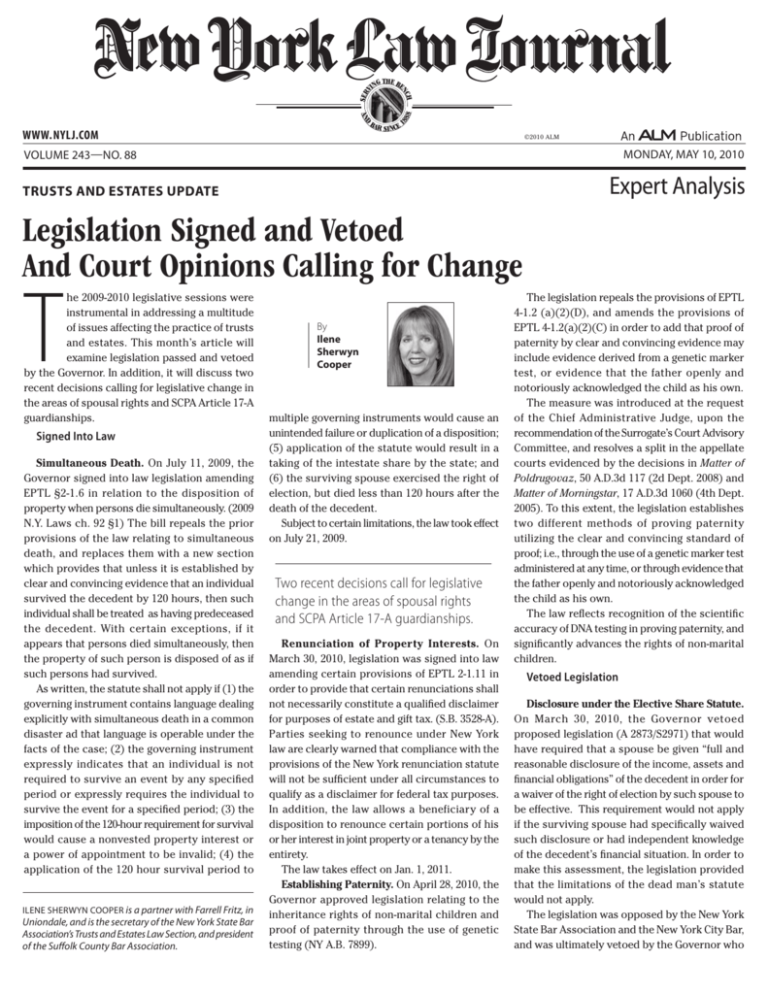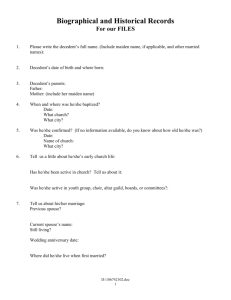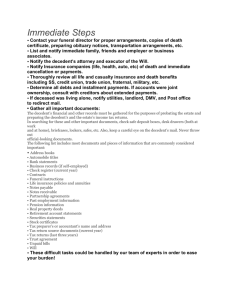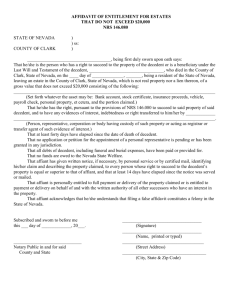
AND
88
8
SER
V
H
NC
THE BE
ING
1
BA
R SINCE
www. NYLJ.com
©2010 ALM
monday, may 10, 2010
Volume 243—NO. 88
Expert Analysis
Trusts and Estates Update
Legislation Signed and Vetoed
And Court Opinions Calling for Change
T
he 2009-2010 legislative sessions were
instrumental in addressing a multitude
of issues affecting the practice of trusts
and estates. This month’s article will
examine legislation passed and vetoed
by the Governor. In addition, it will discuss two
recent decisions calling for legislative change in
the areas of spousal rights and SCPA Article 17-A
guardianships.
Signed Into Law
Simultaneous Death. On July 11, 2009, the
Governor signed into law legislation amending
EPTL §2-1.6 in relation to the disposition of
property when persons die simultaneously. (2009
N.Y. Laws ch. 92 §1) The bill repeals the prior
provisions of the law relating to simultaneous
death, and replaces them with a new section
which provides that unless it is established by
clear and convincing evidence that an individual
survived the decedent by 120 hours, then such
individual shall be treated as having predeceased
the decedent. With certain exceptions, if it
appears that persons died simultaneously, then
the property of such person is disposed of as if
such persons had survived.
As written, the statute shall not apply if (1) the
governing instrument contains language dealing
explicitly with simultaneous death in a common
disaster ad that language is operable under the
facts of the case; (2) the governing instrument
expressly indicates that an individual is not
required to survive an event by any specified
period or expressly requires the individual to
survive the event for a specified period; (3) the
imposition of the 120-hour requirement for survival
would cause a nonvested property interest or
a power of appointment to be invalid; (4) the
application of the 120 hour survival period to
Ilene Sherwyn Cooper is a partner with Farrell Fritz, in
Uniondale, and is the secretary of the New York State Bar
Association’s Trusts and Estates Law Section, and president
of the Suffolk County Bar Association.
By
Ilene
Sherwyn
Cooper
multiple governing instruments would cause an
unintended failure or duplication of a disposition;
(5) application of the statute would result in a
taking of the intestate share by the state; and
(6) the surviving spouse exercised the right of
election, but died less than 120 hours after the
death of the decedent.
Subject to certain limitations, the law took effect
on July 21, 2009.
Two recent decisions call for legislative
change in the areas of spousal rights
and SCPA Article 17-A guardianships.
Renunciation of Property Interests. On
March 30, 2010, legislation was signed into law
amending certain provisions of EPTL 2-1.11 in
order to provide that certain renunciations shall
not necessarily constitute a qualified disclaimer
for purposes of estate and gift tax. (S.B. 3528-A).
Parties seeking to renounce under New York
law are clearly warned that compliance with the
provisions of the New York renunciation statute
will not be sufficient under all circumstances to
qualify as a disclaimer for federal tax purposes.
In addition, the law allows a beneficiary of a
disposition to renounce certain portions of his
or her interest in joint property or a tenancy by the
entirety.
The law takes effect on Jan. 1, 2011.
Establishing Paternity. On April 28, 2010, the
Governor approved legislation relating to the
inheritance rights of non-marital children and
proof of paternity through the use of genetic
testing (NY A.B. 7899).
The legislation repeals the provisions of EPTL
4-1.2 (a)(2)(D), and amends the provisions of
EPTL 4-1.2(a)(2)(C) in order to add that proof of
paternity by clear and convincing evidence may
include evidence derived from a genetic marker
test, or evidence that the father openly and
notoriously acknowledged the child as his own.
The measure was introduced at the request
of the Chief Administrative Judge, upon the
recommendation of the Surrogate’s Court Advisory
Committee, and resolves a split in the appellate
courts evidenced by the decisions in Matter of
Poldrugovaz, 50 A.D.3d 117 (2d Dept. 2008) and
Matter of Morningstar, 17 A.D.3d 1060 (4th Dept.
2005). To this extent, the legislation establishes
two different methods of proving paternity
utilizing the clear and convincing standard of
proof; i.e., through the use of a genetic marker test
administered at any time, or through evidence that
the father openly and notoriously acknowledged
the child as his own.
The law reflects recognition of the scientific
accuracy of DNA testing in proving paternity, and
significantly advances the rights of non-marital
children.
Vetoed Legislation
Disclosure under the Elective Share Statute.
On March 30, 2010, the Governor vetoed
proposed legislation (A 2873/S2971) that would
have required that a spouse be given “full and
reasonable disclosure of the income, assets and
financial obligations” of the decedent in order for
a waiver of the right of election by such spouse to
be effective. This requirement would not apply
if the surviving spouse had specifically waived
such disclosure or had independent knowledge
of the decedent’s financial situation. In order to
make this assessment, the legislation provided
that the limitations of the dead man’s statute
would not apply.
The legislation was opposed by the New York
State Bar Association and the New York City Bar,
and was ultimately vetoed by the Governor who
monday, may 10, 2010
stated, inter alia, that the measure would “replace
well-established common law standards” with
subjective statutory language that could provoke
unnecessary litigation.
Court Decisions
In addition to the foregoing developments,
recent opinions have sought legislative change.
Consider the following:
In Campbell v. Thomas, the Appellate Division
rendered a decision of first impression when
it denied the right of election asserted by the
decedent’s surviving spouse based on the
equitable principle that a party may not profit
from his or her own wrongdoing.
In pertinent part, the record revealed that the
decedent was diagnosed with terminal prostate
cancer and severe dementia, which was apparently
attributable to Alzheimer’s disease. Shortly
thereafter, the decedent’s daughter and primary
caretaker went away for a one-week vacation, and
left the decedent in the care of the defendant,
who was then 18 years his junior. The decedent’s
daughter and other children later learned that
during this time period the defendant married
the decedent and subsequently transferred his
assets into her name.
Six months later, the decedent died, and his
children commenced an action in the Supreme
Court requesting, in part, that the marriage
between their father and the defendant be
declared null and void. Judgment in the plaintiffs’
favor was ultimately awarded by order of the
Appellate Division, which determined that the
decedent lacked the mental capacity to consent
to the marriage, and the matter was remitted to
the Supreme Court for the entry of a judgment
accordingly. The Supreme Court followed suit
by, inter alia, declaring that the defendant had
no legal rights in the decedent’s estate, and the
defendant appealed.
In finding for the plaintiffs on this issue, the
court recognized that the existing statutes,
most particularly, the provisions of EPTL §5-1.1A, require that a party be treated as a surviving
spouse and afforded a right of election against a
decedent’s estate, without regard to whether the
marital relationship itself came about through an
exercise of overreaching or undue influence by
the surviving party. Indeed, the court noted that
when there has been no pre-death annulment, the
provisions of EPTL §5-1.2 do not, by their terms,
disqualify the surviving spouse from asserting
a right of election when the deceased spouse’s
consent was lacking due to fraud or want of
understanding.
Nevertheless, under the circumstances of
the case, the Court opined that the defendant
should not be permitted to benefit from her
undue influence and overreaching, and that as
such, equity required that she be deemed to
have forfeited any rights that would flow from
the marital relationship, including the statutory
right she would otherwise have to an elective
share of the decedent’s estate. In reaching this
result, the court called upon the Legislature to
re-examine the relevant statutes in the EPTL and
Domestic Relations Law and to “consider whether
it might be appropriate to make revisions” that
would accommodate for and prevent the financial
exploitation of the infirm and elderly and unjust
enrichment at the expense of their rightful
heirs.
Campbell v. Thomas, —N.Y.S.2d—, 2010 NY Slip
Op 02082 (2d Dept. 2010).
Moder nization of SCPA Ar ticle 17-A
Sought. Before the court in Matter of John J.H.
was an application by the petitioners for their
appointment as guardians of their 22-year-old son.
Incident to the relief requested, the petitioners
sought the power to sell their son’s artwork and
make charitable contributions with the proceeds
on their son’s behalf.
Legislation amends the provisions
of EPTL 4-1.2(a)(2)(C) in order to add
that proof of paternity by clear and
convincing evidence may include
evidence derived from a genetic
marker test, or evidence that the father
openly and notoriously acknowledged
the child as his own.
Although the court praised the petitioners for
their altruism, it felt constrained by the confines of
the provisions of Article 17-A to deny the additional
relief sought. The court noted that it lacked the
power to grant anything other than a plenary
property guardianship to the petitioners, which
did not include blanket gift-giving authority. While
the court acknowledged that two prior judges of
the court assumed that Article 17-A guardians had
the power to make gifts, it found these decisions
distinguishable and questioned the authority upon
which they were based.
As such, the court expressed frustration and
dissatisfaction with the restrictive provisions of
SCPA Article 17-A, most certainly as compared to
the provisions of Article 81 of the Mental Hygiene
Law, finding it particularly pertinent that Article
81 specifically authorizes the court to allow the
guardian of the property to make gifts from the
funds of the incapacitated person (IP). Toward
this end, the court commended the efforts of
various stakeholders, including public interest
groups, bar associations, advocates for persons
with disabilities, civil liberties organizations, and
relevant governmental authorities, as well as the
SCPA Legislative Advisory Committee, for their
work on a proposal to modernize SCPA Article
17-A in order to effectuate a more progressive and
protective system of guardianship.
Nevertheless, as a result of the limitations of the
statute, the petitioners withdrew their petition in
favor of commencing a proceeding under Article
81, where a more tailored guardianship suitable
to their son’s needs could be obtained.
In re John J.H., NYLJ, March 15, 2010, at 19 (Sur.
Ct. New York County) (Glen, S.)
Note: To be compared with the foregoing
decision is the opinion rendered in Matter of
Yvette A., NYLJ, April 2, 2010, at 26 (Sur. Ct.
New York County) (Webber, S.). Yvette A. was a
contested guardianship proceeding, in which the
petitioner sought his appointment as guardian
for his daughter pursuant to Article 17-A of
the SCPA. The application was opposed by all
parties, including the guardian ad litem, who
recommended that the matter be referred to the
Supreme Court for commencement of an Article 81
guardianship proceeding in order for the special
needs of the alleged incapacitated person (AIP)
to be accommodated. Despite the opposition,
the court granted the petition and appointed
the petitioner Article 17-A guardian of the person
and property of his daughter, subject to certain
restrictions.
In reaching this result, the court noted that
although Article 17-A does not specifically provide
for the tailoring of the guardian’s powers or for
reporting requirements similar to Article 81, the
statute implicitly authorizes the court to impose
such terms and restrictions on a guardianship in
order to best satisfy the interests of the IP. Further,
the court noted that the provisions of Article 17-A
empower the court to modify an existing order
appointing a guardian in order to adapt it to new
circumstances regarding the IP. In view thereof,
the court concluded that it had the power to tailor
an order of guardianship at the outset to suit the
needs of the IP.
Reprinted with permission from the May 10, 2010 edition of the NEW YORK LAW
JOURNAL © 2010. ALM Media Properties, LLC. All rights reserved. Further duplication
without permission is prohibited. For information, contact 877-257-3382 or reprints@alm.
com. # 070-05-10-17





